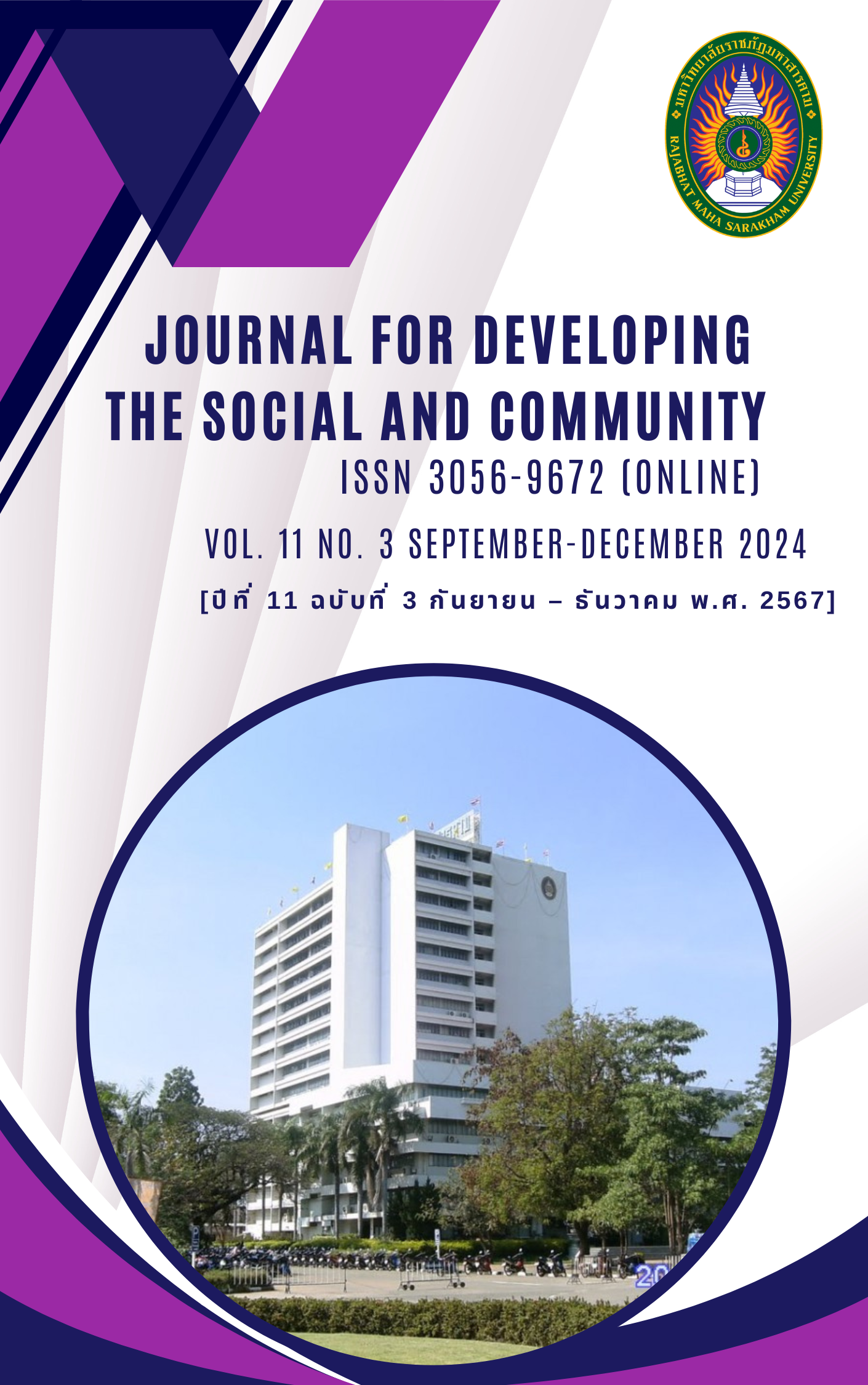“Military under Civilians” Reform: Case of Thailand and Indonesia
Keywords:
Military Reform, Military under Civilians, Comparative Policy, Military and Civil RelationsAbstract
This documentary research “‘Military under Civilians’ Reform: Case of Thailand and Indonesia” aims to conduct a comparative study of the progress of military reform policies in Thailand and Indonesia. The study spans from the political developments leading to the emergence of military reform movements to the incorporation of these reforms into official policies. It also examines the roles of policy entrepreneurs and various factors contributing to the success or failure of military reform policies in both nations. The findings indicate that Indonesia has made more significant progress in implementing "Military under Civilians" reforms compared to Thailand. Three critical factors account for the prominent differences in the implementation of military reform policies between Thailand and Indonesia includes: 1) Social inclinations and the continuity of multiple streams: problem stream, political stream, and policy stream; 2) The continuity of policy entrepreneurs’ roles within the political and cultural context; and 3) Legal frameworks that facilitate military reform.
References
Art and Culture Magazine (2024). "…I had to break my promise…" - General Suchinda's Remark Before the Events of
May 1992". Retrieved on August 12, 2024 from https://www.silpa-mag.com/quotes-in-history/article_314
BBC. (2022). "Black May: 30th Anniversary of the Crackdown on Protests to Oust General Suchinda Kraprayoon”.
Retrieved on August 11, 2024 from https://www.bbc.com/thai/thailand-60963045
Leklaunngarm, B. (2024). “The government increases the defense budget in response to the 'crisis'. Promise to
reform the military in 4 years. How believable?”. Retrieved on July 29, 2024 from https://plus.thairath.co.th/topic/politics&society/104101
Tanjapatkul, N. (2021). "Military Reform: Dismantling the Multifaceted Power of the Military in Thai Society." Retrieved on August 11, 2024 from https://www.the101.world/101-policy-forum-military-reform/
Eoseewong, N. (2022). “Thai Military and Politics”. Retrieved on August 11, 2024 from http://www.matichon weekly .com/column/article_596095
Thippimol, O. (2020). “Is 'military' and 'democratic development' possible? : Lessons from Indonesia”, Retrieved on July 31,2024 from https://www.the101.world/military-and-democracy-in-indonesia/
Weerapaspong. P. (2013). “Military reform: a case study of Indonesia”. Retrieved on July 29, 2024 from https://prachatai.com/journal/2013/01/45031
Phanprasert, P. (2011). “Democratic reform of the Indonesian military under President Susilo Bambang Yudhoyono”, 12th National Conference on Political Science and Public Administration, 8-9 December 2011, Chiang Mai, Thailand.
PPTV Online. (2023). "Wissanu Emphasizes That Proposing Amendments to Military Reform Laws and Martial Law Is Not Easy”. Retrieved on August 11, 2024 from https://www.pptvhd36.com/news/%E0%B8%81%E0%B8%B2%E0%B8%A3%E0%B9%80%E0%B8%A1%E0%B8%B7%E0%B8%AD%E0%B8%87/200219
Setthasuravich, P. (2015). “A study of Policy Agenda Setting: Multiple Streams Model Analysis and Practice”, Journal of Politics, Administration and Law, 7(3), 301-327.
Pawakapan, P. (2023). “Military Reform and the Claws Hidden Beneath the Law.”. Retrieved on August 11, 2024 from https://www.the101.world/barrier-to-thai-military-reform/
Pawakapan, P. (2024). Military-Owned-Businesses: What Do the People Gain?. Retrieved on November 26, 2024 from https://www.the101.world/military-owned-businesses-3/
Pancharoen, S. (2021). “Different and Common Point in The Role of Policy Entrepreneur and Policy Broker”. Journal of Thai Ombudsman, 14 (1). P. 67-86.
Ajalanond, S. (2017). “Military and Democratic Development”. Retrieved on July 30,2024 from https://www.constitutionalcourt.or.th/occ_web/ewt_dl_link.php?nid=9665
Boonsod, S. (2020). “A Study of Legal history of civilian control of the military in Thailand from 2475 -2490 B.E.” Retrieved on November 26, 2024 from https://www.law.cmu.ac.th/lasc/conference/wp-content/uploads/sites/2/2017/09/ 14-ศุภณัฐ160-169.pdf
Sirisawadwattana, S. (2024). "Why Do We Have Conscripts? : The Voices of Dreams and Reality Regarding the Reform of the Thai Military." Retrieved on August 11, 2024 from https://www.the101.world/ conscription-2024/
Suwunwijitr, S. & Klinsuk, W. (2021). “Military and Politics in Thailand”. Journal of Modern Learning Development, 6(3), 354-353.
Wongthamma, T. (2016). History of Southeast Asia. Bangkok: O.S. Printing House.
Boonthanong, U. & Juchitarom, C. (2011). “Military History”. Retrieved on November 26, 2024 from https://doo.rta.mi.th/DooNew/Document%20ebook/L6.pdf
Yeethong, V. (2013). “The Role of Civilian Government in Balancing Civil-Military Relations in Democratization Process” (Doctoral dissertation). Chulalongkorn University, Faculty of Political Science, Department of Political Science.
Ngamlamom, W. (2017). “Coup D’ etat: Role of Military and Politics in Thailand”. Retrieved on August 11, 2024 from
https://www.lib.ku.ac.th/KUCONF/2560/KC5410008.pdf
Boonprong, W. & Buala, T. (2021). “A Comparative Study on the Military’s Political Roles of Thai and Indonesian Armed Forces during B.E. 2535 –2560”. Governance Journal, 10(1), 1-40.
Bunditkul, W. (2012). Republic of Indonesia. Bangkok: Sathaporn Books.
Tanchai, W et al. (2015). “Balance of power in Thai politics and governance”. Nonthaburi: A.P. Graphic Design and Printing Co., Ltd.
Norkaew, Y. (2021). “Reform of the Thai Royal Armed Forces: Guidelines for Constructing a System of Military Professionalization and Reducing the Role of the Royal Thai Armed Forces under the Control of the Civil Government”. Journal of Public Administration, 4 (1), 13-43.
Pankaew, A. (2020). “Military Reform”. Retrieved on July 29, 2024 from http://wiki.kpi.ac.th/index.php?title%E0%B8%9B%E0%B8%8F%E0%B8%B4%E0%B8%A3%E0%B8%B9%E0%B8%9B%E0%B8%81%E0%B8%AD%E0%B8%87%E0%B8%97%E0%B8%B1%E0%B8%9E
Downloads
Published
How to Cite
Issue
Section
License
Copyright (c) 2024 Journal for Developing the Social and Community

This work is licensed under a Creative Commons Attribution-NonCommercial-NoDerivatives 4.0 International License.
Articles that are published are copyrighted by the authors of the articles







